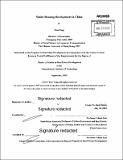| dc.contributor.advisor | Albert Saiz. | en_US |
| dc.contributor.author | Tang, Tian, S.M. Massachusetts Institute of Technology | en_US |
| dc.contributor.other | Massachusetts Institute of Technology. Center for Real Estate. Program in Real Estate Development. | en_US |
| dc.coverage.spatial | a-cc--- | en_US |
| dc.date.accessioned | 2016-02-29T14:59:44Z | |
| dc.date.available | 2016-02-29T14:59:44Z | |
| dc.date.copyright | 2015 | en_US |
| dc.date.issued | 2015 | en_US |
| dc.identifier.uri | http://hdl.handle.net/1721.1/101319 | |
| dc.description | Thesis: S.M. in Real Estate Development, Massachusetts Institute of Technology, Program in Real Estate Development in conjunction with the Center for Real Estate, 2015. | en_US |
| dc.description | Cataloged from PDF version of thesis. | en_US |
| dc.description | Includes bibliographical references (pages 64-66). | en_US |
| dc.description.abstract | The number of Chinese citizens aged 60 years and above is predicted to reach to 440 million by 2050, accounting for roughly 34 percent of the country's total population. The one-child policy has created a declining fertility rate. At the same time, the life expectancy of people keeps rising. The combination of low fertility and long life spans have moved China towards a rapidly aging society. To prepare for the aging society, the Chinese government has issued a series of policies to enhance the senior care industry. The government encourages private and foreign enterprises to invest and engage in senior care services in China. Chinese developers and operators are trying to import foreign practices into the Chinese context. Foreign experts are looking for business opportunities in this untapped market. Although China's senior housing market is undoubtedly appealing, industry players must address several issues before stepping into this market because it is still in infancy period compared to other developed countries. The study examines the key factors that influence senior housing development in China, and those essential elements that foster the industry in U.S. | en_US |
| dc.description.statementofresponsibility | by Tian Tang. | en_US |
| dc.format.extent | 66 pages | en_US |
| dc.language.iso | eng | en_US |
| dc.publisher | Massachusetts Institute of Technology | en_US |
| dc.rights | M.I.T. theses are protected by copyright. They may be viewed from this source for any purpose, but reproduction or distribution in any format is prohibited without written permission. See provided URL for inquiries about permission. | en_US |
| dc.rights.uri | http://dspace.mit.edu/handle/1721.1/7582 | en_US |
| dc.subject | Center for Real Estate. Program in Real Estate Development. | en_US |
| dc.title | Senior housing development in China | en_US |
| dc.type | Thesis | en_US |
| dc.description.degree | S.M. in Real Estate Development | en_US |
| dc.contributor.department | Massachusetts Institute of Technology. Center for Real Estate. Program in Real Estate Development. | en_US |
| dc.contributor.department | Massachusetts Institute of Technology. Center for Real Estate | |
| dc.identifier.oclc | 938682082 | en_US |
